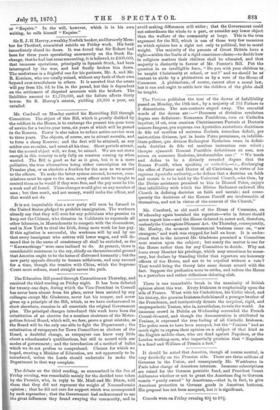The debate on the third reading, as summarized in the
Sun of Friday evening, was remarkable mainly for the decided tone taken by the Premier, who, in reply to Mr. Miall and Mr. Dixon, told them that they did not represent the weight of Nonconformist opinion ; that he did not care for support which was accompanied by such reproaches ; that the Government had endeavoured to use the great influences they found swaying the community, and to
avoid making differences still wider ; that the Government could not subordinate the whole to a part, or consider any lower object than the welfare of the community at large. This is the true argument for the Bill, which is one of those very few measures on which opinion has a right not only to political, but to moral weight. The majority of the parents of Great Britain have a right—within the limits of a rigid conscience-clause—to decide how in religious matters their children shall be educated, and that majority is distinctly in favour of Mr. Forster's Bill. Put the question in an intelligible form, "Do you wish your children to , be taught Christianity at school, or not ?" and we should be as' content to abide by a plebiscitum as by a vote of the House of Commons. A plebiscitum, of course, cannot alter a moral law, but it can and ought to settle how the children of the plebs shall be taught.






























 Previous page
Previous page